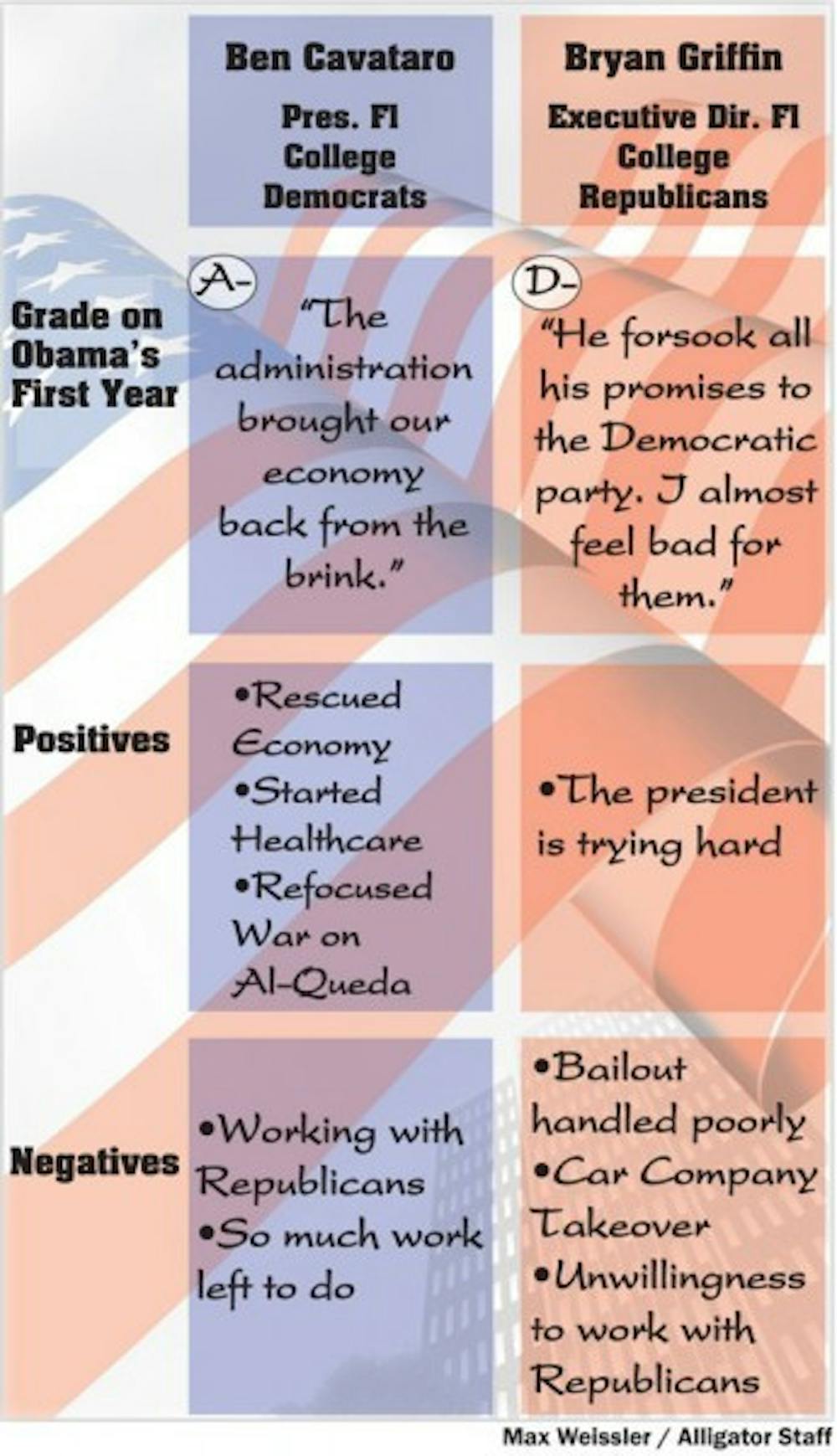Today marks President Obama’s first year in office, and UF political groups have differing views on how his term is going.
Bryan Griffin, UF College Republicans executive director, said the president’s stimulus was poorly designed.
Florida College Democrats President Ben Cavataro disagrees.
“The administration’s quick action averted a deeper recession,” Cavataro said.
In the last year, Obama signed a $787 billion stimulus bill, managed two wars, presided over a health care brawl, avoided a Christmas terrorist attack and responded to one of the worst natural disasters in the Western Hemisphere.
And all the action has cost him in the polls. A year ago, Obama saw an approval rating of more than 60 percent on Real Clear Politics’ national polling average. Today, he has a rating lower than 50 percent.
The St. Petersburg Times’ Obameter, which tracks the president’s campaign promises, says Obama has kept 91 of those promises, compromised on 33 and failed on 14.
Many of those 91 fulfilled promises deal with the stimulus bill passed in February. In addition to giving states funding to fill their budget gaps, the stimulus bill also included funding for high-speed rail, green-energy job training and extended unemployment insurance.
Obama also kept his promise to refocus on Afghanistan when he issued an order in February to send two additional brigades to the country.
At the time of Obama’s inauguration, there were about 34,000 American troops in Afghanistan. Today there are more than double that number, according to the Department of Defense.
Furthering his deployment of troops, Obama announced in December he would be sending an additional 30,000 soldiers to bring the total to about 100,000 troops.
Cavataro and Griffin agreed the president was doing a good job in Afghanistan, but Griffin added he hoped the president would fulfill all of the war’s requirements. One major promise made during the campaign was not to raise taxes on families making less than $250,000. Obama compromised on this promise when he signed an excise cigarette tax increase to help pay for the State Children’s Health Insurance Program.
Cavataro said this is a stretch to call it a tax on the middle class. He said he believes if health care reform passes, the middle class will actually save money.
Griffin disagreed, saying the middle class and the rich both need tax cuts.
“They’re forgetting about the people who support the entitlement programs,” Griffin said. “People making over $250,000 need tax cuts as well.”
Of the 14 campaign promises Obama has broken, according to the St. Petersburg Times, one of them was broken with the flick of a pen early in his presidency.
Obama said he would post non-emergency bills on the White House Web site for five days of public comment before signing them, but he broke this promise with his first piece of legislation.
The Lilly Ledbetter Fair Pay Act was signed by the president just two days after being passed by Congress and was never posted on the White House Web site as Obama promised.
Recently, Republicans have criticized Obama for breaking his promise to televise health care negotiations on C-SPAN.
Two deals brokered with the pharmaceutical industry and hospitals were behind closed doors, and the House-Senate conference to merge health care bills won’t be open to the public either.
Griffin blamed Speaker of the House Nancy Pelosi for these broken promises.
“A lot of those had to do with the way Pelosi operates,“ Griffin said. “I think Obama caved in to Pelosi and [Senate Majority Leader Harry] Reid.”
Cavataro said the bill that wasn’t posted on the Web site wasn’t very controversial and pointed to some of the tough rules on lobbyist the White House has enacted to make government more ethical.
While it’s been a busy 365 days for the 44th U.S. president, Obama still has many promises to keep during the next three years.
Health care legislation is stalled in Congress, and the president has yet to repeal the army’s “Don’t Ask Don’t Tell” policy or pass a major energy bill.






